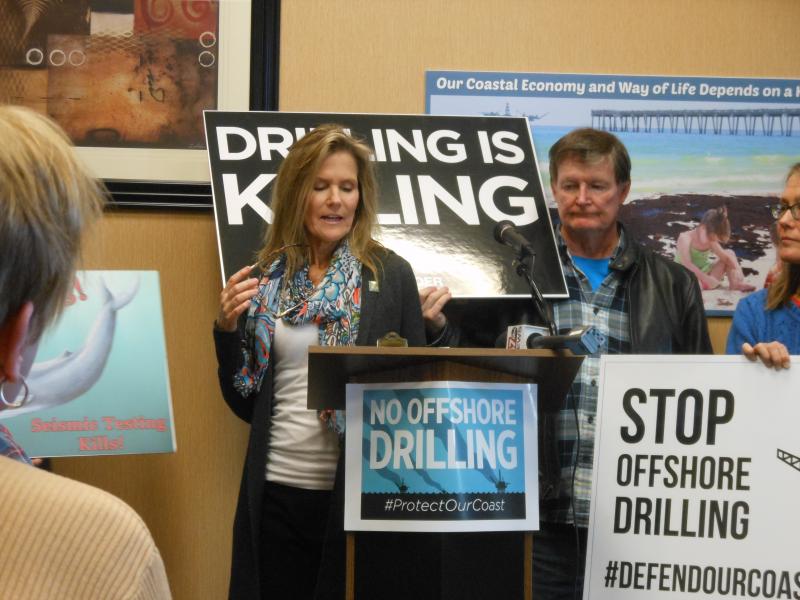President Donald Trump’s administration approved permits that would allow seismic testing along the country’s southern Atlantic seaboard. Within days, local mayors, environmental and tourist officials all spoke out against the decision.
The National Marine Fisheries Service announced Nov. 30 it had awarded permits to five marine contractors to survey and conduct seismic tests in the ocean waters from New Jersey to Central Florida. These seismic tests are conducted to search for oil and gas deposits beneath the ocean floor; depending on the results, they may be a precursor to offshore oil drilling.
Suzanne Thurman, MERR Institute executive director, said the decision raises serious concerns. Seismic testing and other industrial noise in the oceans has become a disruptive force for marine animals and their habitat, she said.
“For whales, dolphins, seals and porpoises, sound is their most important sense for survival. These marine animals use sound as a primary means of finding food, navigating, and staying connected with their social groups and offspring,” Thurman said in a Dec. 2 email. “This extremely invasive level of sound will cause hearing loss, both temporary and permanent, brain swelling and hemorrhaging, tissue and internal organ damage, displacement and disorientation, loss of prey source, and inability to raise young in their natural habitat.”
In a press release Nov. 30, Oceana, an international ocean watchdog, said before seismic airgun blasting can begin in the Atlantic, the Bureau of Ocean Energy Management must issue final permits, which are expected in the near future.
According to Oceana, seismic airguns release pressurized air blasts to create powerful sound waves that travel through the water column and sea bed, and provide information about the seafloor. These sound waves travel as echoes back to the surface, where they are captured by audio monitors.
Oceana said seismic airgun blasting characteristics included loud blasts repeated every 10-12 seconds for days, weeks, or months at a time; 12-48 individual airguns are towed in each array, with a single ship towing up to 96 airguns; the surface area covered by the largest seismic array was 21 times larger than the National Mall in Washington, D.C.; under the right conditions, seismic airgun sounds can be heard up to 2,500 miles from the source.
Thurman said seismic testing is a precursor to offshore oil drilling. In September, at a Bandstand event in Rehoboth, Gov. John Carney signed two bills aimed at protecting Delaware’s shores from that threat. The first prohibits drilling for oil and natural gas in Delaware's coastal zone. The second requires the Department of Justice, the Department of Natural Resources and Environmental Control, and other state agencies to review offshore oil and gas exploration leases along Delaware's coast to the extent permitted under the federal Coastal Zone Management Act.
“Seismic testing and subsequent offshore drilling is guaranteed to produce water contamination just from daily operations, and a spill would be devastating to any coastal community,” said Thurman. “The amount of oil that is projected to be available off of Delaware is minuscule, with only enough for a 1.5-year's supply.”
In an email Dec. 1, Dewey Beach Mayor TJ Redefer said he was sure all of the residents of Dewey Beach, and all of Delaware will join him in opposing the president’s decision. He said that was why he was at the September bill signing banning offshore drilling in Delaware’s waters.
“We must protect our ocean from offshore drilling now and forever,” Redefer said.
Lewes Mayor Ted Becker said Lewes was the first community in Delaware to oppose seismic testing, describing the the decision as “very disappointing.”
Becker said in an email Dec. 2, the city remains in full support of the efforts of the governor and state Legislature in its efforts to oppose this action.
In a Dec. 3 email, Rehoboth Mayor Paul Kuhns said he was very disappointed in the decision, noting he was was one of many officials to sign a petition against this type of drilling months ago.
Scott Thomas, Southern Delaware Tourism executive director, put the decision into a financial perspective. He said Delaware’s clean beaches are the anchor to Sussex County’s $1.7 billion tourism economy that supports 18,000 jobs.
Thomas said Delaware’s already challenged with preparing to address natural disasters, without adding this man-made risk.
“One accident involving offshore drilling could wipe this all out as we have seen with past oil spill catastrophes such as Deepwater Horizon off Louisiana’s coast,” Thomas said in an email Dec. 2.
Chris Flood has been working for the Cape Gazette since early 2014. He currently covers Rehoboth Beach and Henlopen Acres, but has also covered Dewey Beach and the state government. He covers environmental stories, business stories and random stories on subjects he finds interesting, and he also writes a column called Choppin’ Wood that runs every other week. He’s a graduate of the University of Maine and the Landing School of Boat Building & Design.


















































